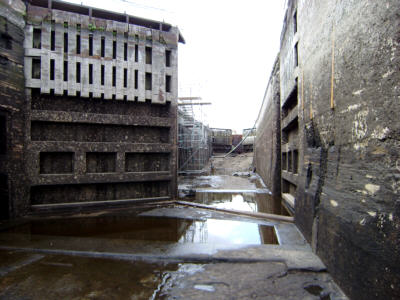British Waterways needed to drain Pollington Lock to enable its operations team to carry out repair works at the site, which involved the replacement of two of the seven sluices and general repairs to the lock gates and cills.
However, Pollington Lock is no ordinary lock - it is one of the largest locks on the waterway system! The original lock was built around 1825 when the Knottingley to Goole section of the waterway was opened to avoid the tidal River Ouse. The lock was extended a number of times, most recently in 1970, to accommodate larger commercial vessels.
The lock has four sets of gates, which are all operational, which can be used in combination to create a chamber of varying length, according to the size of vessel passing through.
Click here to see a Google aerial view of Pollington Lock.
Around 850 loaded barges pass along the Aire and Calder each year, carrying mainly oil or sand. Each barge holds about 13 lorry loads, keeping around 11,000 loaded lorries off local roads each year.
The route through Pollington is also used by thousands of pleasure boaters, as it forms a vital link from Leeds and Wakefield to Doncaster and to the tidal River Trent at Keadby.

Pollington Lock during refurbishment work. Photo: BW
Click here to see more photographs from British Waterways showing some of the work that has taken place at Pollington Lock.


No comments:
Post a Comment
Please feel free to comment on this item.
If you do not have a Blogger/Google etc account, then please click on "Name/URL" and type in your name or nickname.
If you have no URL you can leave that part blank.
Please do not post as "Anonymous".